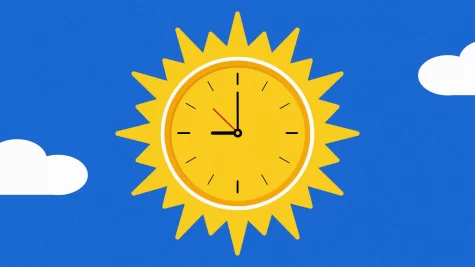The Future of Daylight Savings: Will the Controversy Persist?
March 17, 2023
 Twice a year, Americans are obligated to change their clocks in order to allow for the sun to set at a later time. This idea of the “Spring forward” and “Fall back” has consumed the country, and has led to much controversy in recent years. The majority of the world, excluding countries along the equator, have implemented DST (Daylight Savings Time) at some point in time. However, Time and Date reports that less than 40% of countries in the world currently use DST.
Twice a year, Americans are obligated to change their clocks in order to allow for the sun to set at a later time. This idea of the “Spring forward” and “Fall back” has consumed the country, and has led to much controversy in recent years. The majority of the world, excluding countries along the equator, have implemented DST (Daylight Savings Time) at some point in time. However, Time and Date reports that less than 40% of countries in the world currently use DST.
DST was originally implemented to allow us to keep up with our circadian rhythm, which comprises the body’s “physical, mental, and behavioral changes that follow a 24-hour cycle” (National Institute of Health). Our body responds to stimuli related to light and darkness, meaning that the time of day affects most living things and the way that they process these changes. If DST is meant to help Americans and people from other countries around the world to function better, why is there any controversy?
This time shift known as Daylight Savings has been long argued and disputed. Some studies have suggested that even a one-hour difference on our clocks can be very harmful to our health. It can disrupt our natural sleep cycles which then negatively affects our mental and physical health. Time and Date reported that heart attack rates increased after switching to DST in the spring, and that it is also the main cause for traffic accidents because of tiredness. In addition, DST is a big trigger for mental illnesses, including bipolar disorder, seasonal affective disorder (SAD), and depression. After we set the clocks back to standard time, there is an 11% spike in depression cases, as well as suicide rates increase following both Spring and Fall DST shifts.
On March 15th, 2022, the disputed topic of DST took to Congress. A group of lawmakers in Congress introduced a bill which would make daylight savings the new and permanent standard time. This was called the Sunshine Protection Act, and it shocked citizens when it was approved in the Senate. The bill did not make it through the House of Representatives, but it is set to continue its journey through the legislative system again. Senator Mario Rubio introduced the legislation of the bill and stated in a press release earlier this month, “This ritual of changing time twice a year is stupid. Locking the clock has overwhelming bipartisan and popular support. This Congress, I hope that we can finally get this done.” While many politicians are for the Sunshine Protection Act, citizens are very hesitant.
As long as DST sticks around, what can we do to make the transition easier? First of all, the best thing to do is wake up a bit earlier than usual the week before moving the clock forward. This will help followers get out of bed more easily following the switch, along with helping to keep spirits high throughout the day. Getting exercise, going outside, and eating a healthy breakfast first thing in the morning can also help your body adjust to a new clock. Food signals the start of the day, and sunlight helps adjust your processing systems and your body clock.
As DST will remain in the majority of the United States, it is important that everyone remains informed about the side effects and ways to stay as susceptible to them as possible.
















































































































































